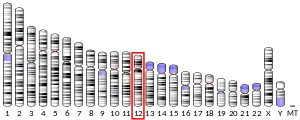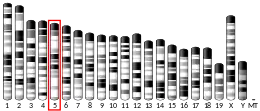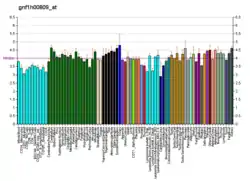Hydroxycarboxylic acid receptor 1
Hydroxycarboxylic acid receptor 1 (HCA1), formerly known as G protein-coupled receptor 81 (GPR81), is a protein that in humans is encoded by the HCAR1 gene.[5][6] HCA1, like the other hydroxycarboxylic acid receptors HCA2 and HCA3, is a Gi/o-coupled G protein-coupled receptor (GPCR).[7][8] The primary endogenous agonist of HCA1 is lactic acid (and its conjugate base, lactate).[7][8]
| HCAR1 | |||||||||||||||||||||||||||||||||||||||||||||||||||
|---|---|---|---|---|---|---|---|---|---|---|---|---|---|---|---|---|---|---|---|---|---|---|---|---|---|---|---|---|---|---|---|---|---|---|---|---|---|---|---|---|---|---|---|---|---|---|---|---|---|---|---|
| Identifiers | |||||||||||||||||||||||||||||||||||||||||||||||||||
| Aliases | HCAR1, GPR104, GPR81, HCA1, LACR1, TA-GPCR, TAGPCR, FKSG80, hydroxycarboxylic acid receptor 1 | ||||||||||||||||||||||||||||||||||||||||||||||||||
| External IDs | OMIM: 606923 MGI: 2441671 HomoloGene: 13060 GeneCards: HCAR1 | ||||||||||||||||||||||||||||||||||||||||||||||||||
| |||||||||||||||||||||||||||||||||||||||||||||||||||
| |||||||||||||||||||||||||||||||||||||||||||||||||||
| |||||||||||||||||||||||||||||||||||||||||||||||||||
| |||||||||||||||||||||||||||||||||||||||||||||||||||
| |||||||||||||||||||||||||||||||||||||||||||||||||||
| Wikidata | |||||||||||||||||||||||||||||||||||||||||||||||||||
| |||||||||||||||||||||||||||||||||||||||||||||||||||
Lactate activates HCA1, which in turn inhibits lipolysis in fat cells.[9][10]
References
- GRCh38: Ensembl release 89: ENSG00000196917 - Ensembl, May 2017
- GRCm38: Ensembl release 89: ENSMUSG00000049241 - Ensembl, May 2017
- "Human PubMed Reference:". National Center for Biotechnology Information, U.S. National Library of Medicine.
- "Mouse PubMed Reference:". National Center for Biotechnology Information, U.S. National Library of Medicine.
- "Entrez Gene: GPR81 G protein-coupled receptor 81".
- Lee DK, Nguyen T, Lynch KR, Cheng R, Vanti WB, Arkhitko O, Lewis T, Evans JF, George SR, O'Dowd BF (September 2001). "Discovery and mapping of ten novel G protein-coupled receptor genes". Gene. 275 (1): 83–91. doi:10.1016/S0378-1119(01)00651-5. PMID 11574155.
- Offermanns S, Colletti SL, Lovenberg TW, Semple G, Wise A, IJzerman AP (June 2011). "International Union of Basic and Clinical Pharmacology. LXXXII: Nomenclature and Classification of Hydroxy-carboxylic Acid Receptors (GPR81, GPR109A, and GPR109B)". Pharmacological Reviews. 63 (2): 269–90. doi:10.1124/pr.110.003301. PMID 21454438.
- S Offermanns, SL Colletti, AP IJzerman, TW Lovenberg, G Semple, A Wise, MG Waters. "Hydroxycarboxylic acid receptors". IUPHAR/BPS Guide to Pharmacology. International Union of Basic and Clinical Pharmacology. Retrieved 13 July 2018.
{{cite web}}: CS1 maint: multiple names: authors list (link) - Liu C, Wu J, Zhu J, Kuei C, Yu J, Shelton J, Sutton SW, Li X, Yun SJ, Mirzadegan T, Mazur C, Kamme F, Lovenberg TW (January 2009). "Lactate inhibits lipolysis in fat cells through activation of an orphan G-protein-coupled receptor, GPR81". The Journal of Biological Chemistry. 284 (5): 2811–22. doi:10.1074/jbc.M806409200. PMID 19047060.
- Cai TQ, Ren N, Jin L, Cheng K, Kash S, Chen R, Wright SD, Taggart AK, Waters MG (December 2008). "Role of GPR81 in lactate-mediated reduction of adipose lipolysis". Biochemical and Biophysical Research Communications. 377 (3): 987–91. doi:10.1016/j.bbrc.2008.10.088. PMID 18952058.
Further reading
- Takeda S, Kadowaki S, Haga T, Takaesu H, Mitaku S (June 2002). "Identification of G protein-coupled receptor genes from the human genome sequence". FEBS Letters. 520 (1–3): 97–101. doi:10.1016/S0014-5793(02)02775-8. PMID 12044878. S2CID 7116392.
- Mao M, Biery MC, Kobayashi SV, Ward T, Schimmack G, Burchard J, Schelter JM, Dai H, He YD, Linsley PS (June 2004). "T lymphocyte activation gene identification by coregulated expression on DNA microarrays". Genomics. 83 (6): 989–99. doi:10.1016/j.ygeno.2003.12.019. PMID 15177553.
- Madaan A, Nadeau-Vallée M, Rivera JC, Obari D, Hou X, Sierra EM, Girard S, Olson DM, Chemtob S (September 2016). "Lactate produced during labor modulates uterine inflammation via GPR81 (HCA1)". American Journal of Obstetrics and Gynecology. 216 (1): 60.e1–60.e17. doi:10.1016/j.ajog.2016.09.072. PMID 27615440.
This article is issued from Wikipedia. The text is licensed under Creative Commons - Attribution - Sharealike. Additional terms may apply for the media files.




